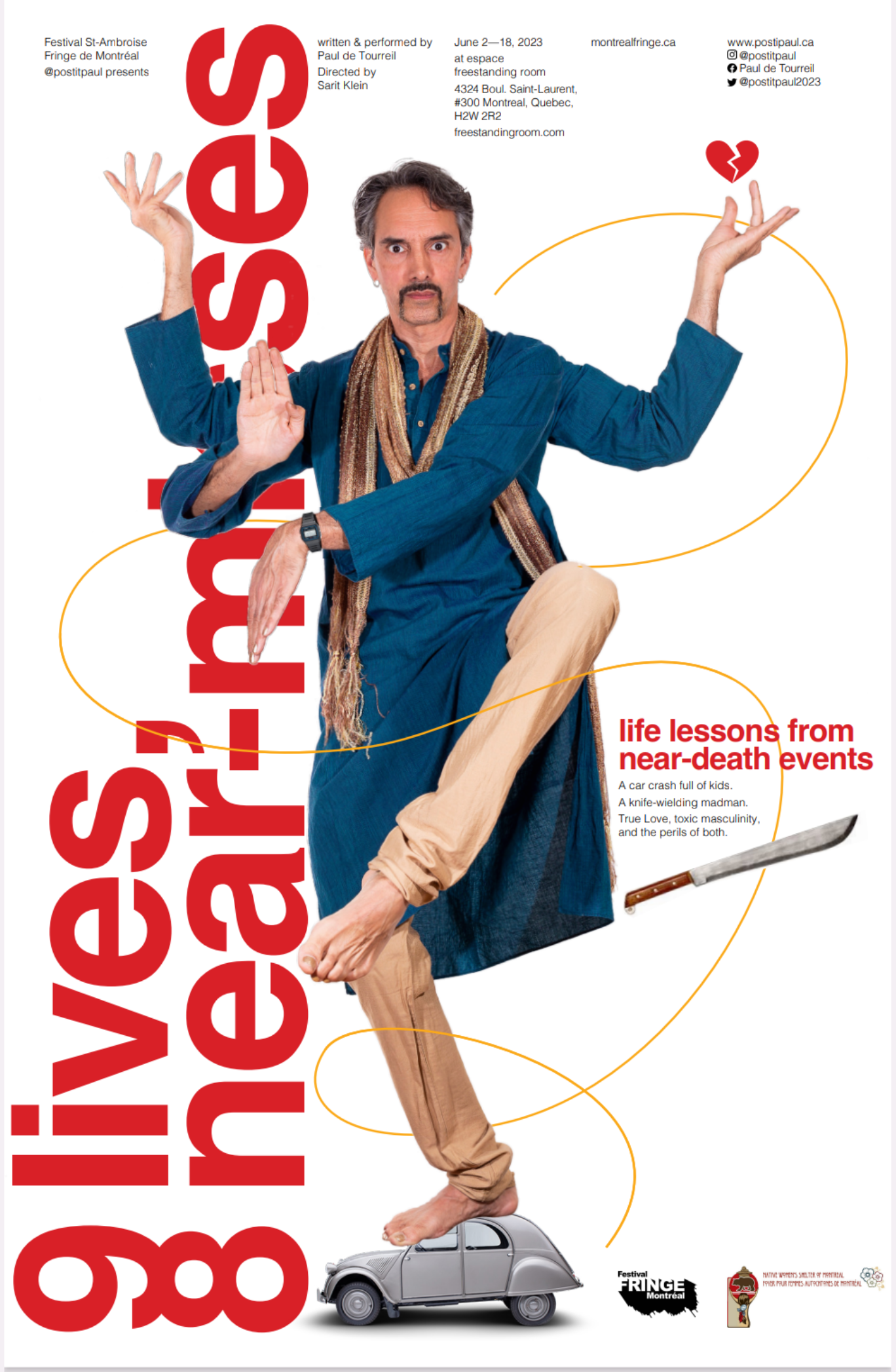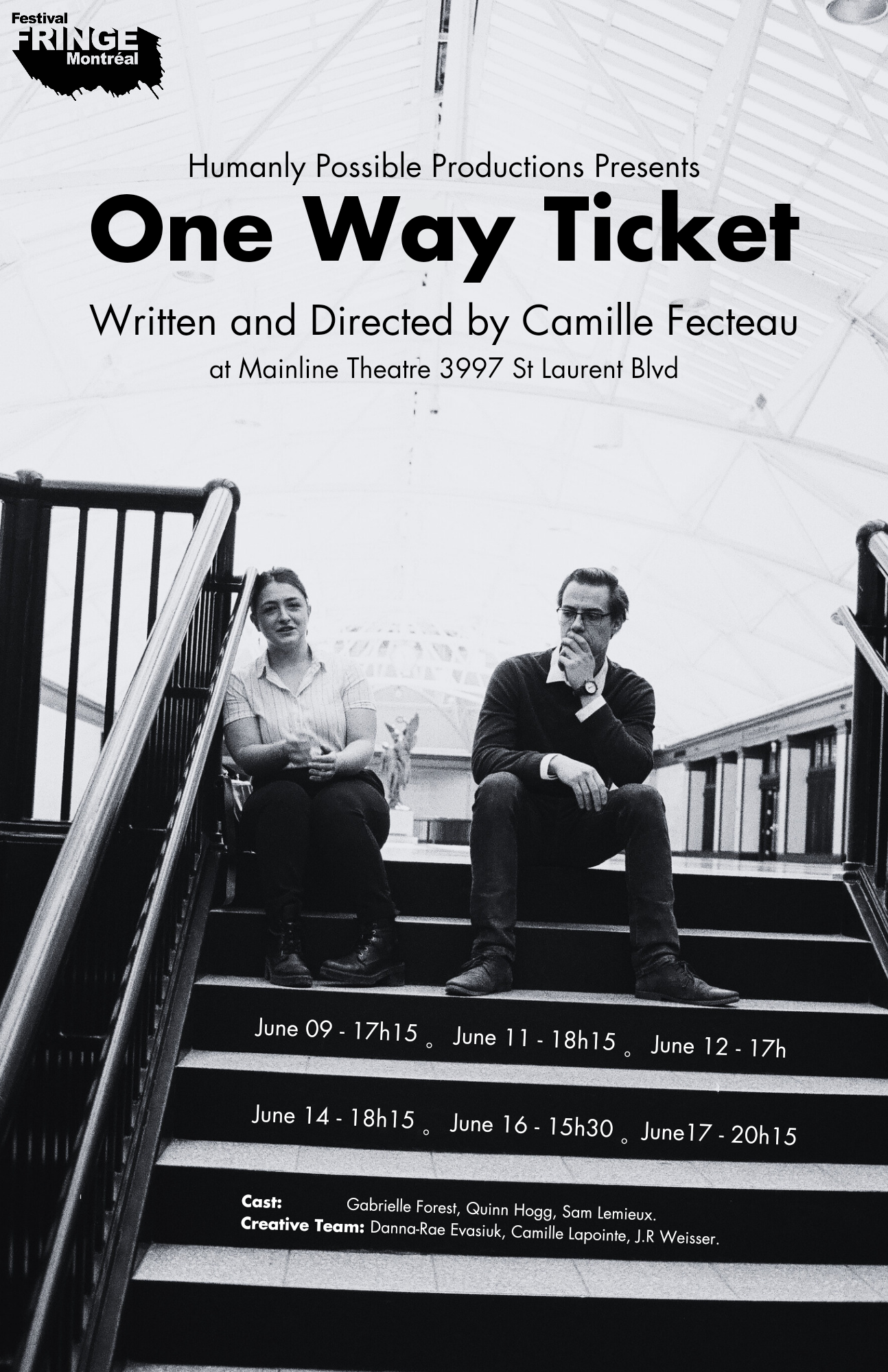Darragh’s Reviews
9 Lives, 8 Near Misses
The still-standing, ever-expanding Freestanding Room has always been an ideal incubator for intimate, direct-address one-person shows, at the Fringe Festival and all year round. Paul de Tourreil fills this room with high stakes and humour, and the refreshing warmth of wholesome masculinity. He welcomed his audience with a tin tray of Indian treats, dressed traditionally in the garb displayed on his well-composed poster (props to the skillful setting a mood of ease and comfort within a small space.
The speed at which de Tourreil’s text alights from one idea to the next, literally and metaphorically jumping in time and space, might have left the audience behind in a larger venue. The writing exemplifies the power of the personal evoking the universal. An audience member does not have to share de Tourreil’s identity, love story, lore or frequent dancing with near death to find their own stories of family, heartbreak and revelation bubbling up within them as they watch and listen.
The limits of the space, particularly lighting and sound, kept the show’s main energy source, Paul himself, centered and physically compelling. When a show deals so much in the interior world of matters of the heart, mental health and the tribulations of toxic masculinity, a temptation to let sound effects or projections bring that drama out of the body is always there, but 9 Lives 8 Near Misses demonstrates Paul's powerful corporeal storytelling, and strikes a brilliant balance.
The greatest strength of this suitcase show is its openhearted writing. Some one-person shows are carried by charismatic, acrobatic or technologically arresting elements, but one can see that de Tourreil works with words by trade. As a translator, and editorial writer, one might not expect so much extroverted ease or physical prowess of the performing arts and these are the magic ingredients to the art of an engaging one-man show. Never shouting his delivery of his own words (why is this such a thing male actors do), and never getting in his own way with excessive prop comedy. The story's structure occasionally evokes the facile testifying of a 12-step-program that is very inline with the canon of policed masculinity (think Jordan Peterson or Rollo Tomassi) which the playwright is interested in resisting and rejecting, if not deconstructing or subverting. One can feel, more than hear, bell hook's "the Will to Change" coursing through the subtext of the script. The deeply personal truth which sings throughout these testimonies is a credit to award-winning director Sarit Klein as much as to de Tourreils breezy stage presence.
One Way Ticket
Clearly influenced by giants of existentialism like Sartre and Beckett, Camille Fecteau’s One Way Ticket stages two souls slammed into the liminal purgatorial after life set on the platform of a train. The Mainline Theatre Mainspace is sparsely set with a bench and a seat, the latter being the perching point of the aloof conductor, kitted out with a watch chain and a delivery reminiscent of Hitchcock's presentations, to Quinn Hogg’s credit. The two souls, a young woman about to embark on a job interview and a middle aged man expecting his first child, are played solidly and patiently by the charming, smiling Gabrielle Forest and the alternately intense and jocular Sam Lemieux.
The action of the text book-ends the body of it, beginning with the panic of the two souls realizing that they have died, which eventually calms to a crestfallen acceptance, ending with the actual conflict of the play promised in the copy promoting the show on the Fringe Website; that one single ticket onto the imminent train that leads back to the land of the living can be taken by one of these well-meaning people with the rest of their lives ahead of them. The main middle section of the play features very long monologues performed with the pace of people with all the time in the universe to unfold themselves to each other. While this makes for very three-dimensional characterization, and some beautiful moments for Lemieux and Forest to exhibit acting skills, it does drag. Perhaps this valley of energy serves the setting of purgatory for the audience's experience. It's only near the end that the conductor acknowledges the two souls and announces that the train back to the living world arrives in 5 minutes. The power of a ticking time bomb in a one-act play would have been more compelling were it revealed at the outset, or shared with the characters in the first section. Then their expositional speeches recounting their lives would have been charged with the urgency of the will to live, or reveal a disenchantment with the drudgery of their mortal existence, but clear motivations would have breathed more life into these dead people.
The biggest creative risks in this show are the work of professional designer and practicing member of Montreal's feminist performance company Imago Theatre, Danna-Rae Evasiuk. Lights shifted dramatically with dawning realizations or when tragic backstory beats were reached. This paid off against the minimalism of only the most necessary set pieces. The sound design conveyed the liminality of limbo very clearly, and a sighing drone underscored the monologues allowing the audience to dream rather than merely visualize the stories being recounted between the strangers on stage.
A sudden and sad plot development in the final moments of this show takes the tone from an exercise in existential melancholy to the operatically tragic. This beat did make me think specifically of a similar moment in Sartre’s Huis Clos. Audience members vocally gasped at this plot point, which must have been gratifying for performers, but whether the open-ended final moments pay off will be up to the viewers to decide when they return to the world of the living in the lobby.
Le Fruit Défendu
One might not expect a show based on the simple story of the book of Genesis to become the source material for so much playful performance range. A narrow stage became the dark and unforgiving Garden of Eden where Adam and his wife Eve discover each other’s bodies and the Creation around them. A microphone brought the cowardly power of the patriarchy to its knees, and some truly exuberant musical scoring brought this quick and dirty half-hour show to a full-bodied Fringe Festival success. A Bible story subverted into such a space for queer identity, sexual rebellion, rock and roll and a sickening drag number by Satan himself. The artists of Les Talons Fous are physically and vocally strong as hell.
Branded and marketed with an intense visual language of shadow and light, man and woman, heaven and hell, it’s a delightful surprise when the pole aerialists Mikael Morin & Luca Max break free from their opening dance theatre scene setting on a pole far to stage left, into making full use of the Jean-Claude Germain studio of the Theatre d’Aujourd’hui. The mood is set with the deep loud voice of God the Father reading straight from the Good Book the story most of us already know - that He created Adam and made Eve second to her husband from his rib bone, that they are to honour each other and obey their heavenly father’s commands not to eat of le fruit defendu. The forbidden fruit itself hangs ominously above their bodies writhing and twisting around the pole very serpent-like. This critic actually could not tell if a very athletic grand jeté from Adam on the pole that kicked the fruit from its hanging place atop the pole was accidental, but it fell with the uncoiling of a rope downstage directly where Eve came to be tempted inevitably to eat it.
That’s not a spoiler, right? When Eve finds herself alone, she hears the voices of God, Satan, and Adam from off stage, and they cannot easily be distinguished from each other. Satan emerges in radiant red and black leather drag to seduce her - and effectively the audience - that tasting the fruit will give her super powers of feminine dominance, that she will slay and be a QUEEN! These powers are demonstrated with a drag number of such raunchy floor work it got the whole audience hollering and cheering in this prestigious theatre’s studio. When Eve ingests the forbidden fruit, a triumphant transformation proves the devil did not deceive her in this version of the story.
Le Fruit Defendu literally left their amped up audience wanting more. Director Samuel Tetrault brought a fitting campy and playful style out of the performers who recite the poetic and refreshingly contemporary dialogue without subtlety or hesitation and it works so well. This critic encourages Les Talons Fous to explore this simple, timeless presence and bring us more of the pole, more drag, more balanced sound design and more runtime next year.
Still Alive
A lyrical ode to a lust for life's simple pleasures, and deservedly nominated for the Fringe Festival Awards Best Text by the Playwright’s Guild of Canada, Leya Graie is playwright and performer of Still Alive, a triumphant first production from Moonlit Cat Productions. The Mission Santa Cruz made for a solemn and sacred space for this story of a young woman's toeing the line between a simple life and a quiet death. A single white bed held the softly breathing Ava as the audience entered the wide space generously provided by Mission Santa Cruz. The beeping of an irregular heart rate being metered out by medical machinery set the scene before the show has begun.
Graie performs this character with a youthful femininity that makes one wonder if they are playing their own age in this character or one much younger. The costume elements shroud their frame in a very angelic, ungendered way, and their voice lilts through the levels of falsetto and a chest resonance right behind their clavicles. Lines are delivered with a whispering frailty that hardly hit the walls, but the audience leaned in to listen better, lured by the docile delivery.
Director Rachel Renaud has just wrapped up some work on their upcoming film, produced under their company Chez Renaud pictures, and there is a cinematic touch to the performance they drew out of their actor. I imagine there would be a lot of pressure on a young director to synthesize the vision of a text when the performer wrote the play, but it’s also very easy to see how a synthesis in vision could come from these two creatives. Renaud and Graie have a similar youthful fairy-like set of mannerisms between their beautiful frames that each remind one of the other. Once, Ava descended from her bed on the most timid of tip toe, and alighted across the stage in a breezy swoosh that evoked the ethereally-feminine subjects of John William Waterhouse paintings. It didn’t grant the performance a lot of gravity, or the wisdom of years one expects to go hand in hand with concerns of approaching death and releasing the blessings of life. It is, after all, the story of dying too young.
The design elements reflected the experience of the team behind the curtain of this show. Ava’s costume had more of the formal softness of a baptismal gown than of a stiff hospital issue. Very clear and simple lights selectively washed and narrowed the cosmic space that Ava and her audience inhabit, forming the structure of limbo in beams and darkness. Ava’s bed is the center of this universe. Songs more than sounds soften the percussive urgency of the heart rate monitor beeps, and those chosen were always lyrically poignant feminine voices, a credit to the sound design. Costume, lights and sound were co-designed by Elizabeth Nyveen, and it’s clear their vision was no less aligned with the director and playwright, and all achieved with a simple elegance that the limited resources of indie fringe theatre can inspire in the best of us.





